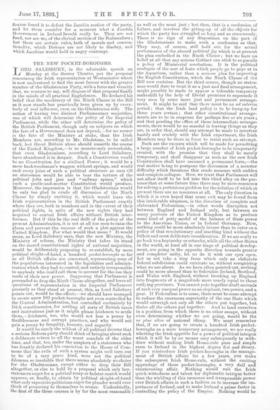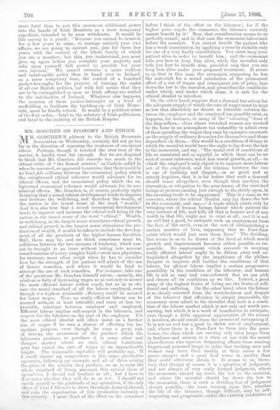THE NEW POCKET-BOROUGHS. L ORD SALISBURY, in the admirable speech on
Monday at the Surrey Theatre, put the proposal concerning the Irish representation at Westminster which is now understood to find the most favour with the greater number of the Gladstonian Party, with a force and vivacity that, we venture to say, will dispose of that proposal finally in the minds of all practical Englishmen. He declared his belief that the machinery of the Ninth Clause in the Bill as it now stands has practically been given up by every- body of real influence, even on the Gladstonian side. The notion of having two distinct Parliamentary majorities, one of which will determine the policy of the Imperial Parliament, while the other will determine the policy of the British Parliament, though only on subjects on which the fate of a Government does not depend,—for no sooner is the fate of the Ministry at stake, than the Irish Members are, according to Mr. Gladstone, to be called back, lest Great Britain alone should unsettle the course of the United Kingdom,—is so monstrously unworkable, that even Gladstonians, according to Lord Salisbury, have abandoned it in despair. Such a Constitution would be no Constitution for a civilised Power ; it would be a mere backwoodsman's waggon without springs, and would rack every joint of such a political structure as ours till no statesman would be able to bear the torture of the political jolts and jars and "railway spines," which such a pestle-and-mortar Constitution would produce. Moreover, the impression is that the Gladstonians would be only too glad to evade all discussion of the Ninth Clause by simply omitting it, which would leave the Irish representatives in the British Parliament exactly where they are, both in numbers and in the extent of their political rights, in spite of the new rights they had acquired to control Irish affairs without British inter- ference. But if this be the real drift of the policy of the present Ad ministration, it is not at all too soon to raise the alarm and prevent the success of such a plot against the United Kingdom. For what would that mean ? It would mean, as Lev] Salisbury says, that the new Ministry, the Ministry of reform, the Ministry that takes its stand on the sacred constitutional rights of national majorities, would be deliberately proposing to re-establish, by mere political sleight-of-band, a hundred pocket-boroughs so far as all British affairs are concerned, representing none of the populations interested in the legislation and adminis- tration which they had to control, and entirely irresponsible to anybody who could call them to account for the use they made of their new power. Supposing that Parliament is persuaded to drop the Ninth Clause altogether, and leave all questions of representation in the Imperial Parliament precisely as they stand at present, this, as Lord Salisbury points out, would be the effect;—we should have managed to create anew 103 pocket-boroughs not even controlled by the Central Administration, but controlled exclusively by Irish constituencies, for settling all sorts of British taxes and institutions just as it might please Irishmen to settle them,—Irishmen, too, who would not lose a penny by thriftlessness and corrupt practices, and who would not gain a penny by frugality, honesty, and sagacity. It would he surely the wildest of all political dreams that a serious Reform party should think of bringing about such a deliberate return to the worst scandals of the older time, and that, too, under the auspices of a statesman who has frankly declared his conviction to the House of Com- mons that the evils of such a system might well turn out to be of a very grave kind, were not the political dilemma so insoluble that there seems absolutely no choice for the Gladstonians, except either to drop their Bill altogether, or else to hold by a proposal which only boy- statesmen eager for a political romp or bolster-match would approve, or, finally, to obtain by political sleight-of-hand what only rapacious politicians eager for plunder would ever think of proposing to themselves to secure. Undoubtedly, the first of the three courses is by far the most reasonable as well as the most just ;- but then, that is a confession of failure, and involves the giving-up of all the objects for which the party has struggled so lung and so strenuously. There is no sign of any disposition on the part of the Gladstonians to make such a confession as that. They may, of course, still hold out for the actual performance of the absurd political jig which is at present the plan embodied in the Ninth Clause ; but we have no belief at all that any serious Cabinet can stick to so puerile a policy of Ministerial acrobatism. It is the political analogue of the sort of feats which people go to gapo at, in the Aquarium, rather than a serious plan for improving the English Constitution, which the Ninth Clause of the Bill now contains. But the third course, though no states- man would dare to treat it as a. just and final arrangement, might possibly be made to appear a tolerable temporary makeshift by the help of liberal promises to supersede it very soon by some more just and permanent arrange- ment. It might be said that there must be an ad interim. period ; that the Irish land policy is to be hung-up for three years certain ; that other constitutional arrange- ments are to be in suspense for perhaps five or six years ; and that pending the efflux of these intermediate arrange- ments, there would be no scandal in leaving things as they are, in order that, should any attempt be made to interfere hastily and crudely with the Irish experiment, the Irish Members may be there in force to resist such an attempt. Such are the excuses which will be made for permitting a large number of Irish pocket-boroughs to be temporarily created, with the promise that they shall be merely temporary, and shall disappear as soon as the new Irish Constitution shall have assumed a permanent form,—the real motive being to postpone the discussion of a monster difficulty which threatens this crude measure with sudden and complete collapse. Now, we trust that Parliament will not allow itself to be led into this blind alley on the pre- tence that at some future time there may be more resources for solving a portentous problem for the solution of which at present there are no resources at all. The only direction in which it is even hoped that some exit may be found from this intolerable situation, is the direction of complete and elaborated Federalism,—in other words disruption not between England and Ireland only, but between so many portions of the United Kingdom as to produce some kind of petty model of the balance of State power in the American Union, or in federal Germany. Now, nothing could be more absolutely insane than to enter on policy of that revolutionary and startling kind without the fullest and most deliberate consideration. If we are really to go back to a heptarchy or octarchy,while all the other States in the world, at least all in our stage of political develop- ment, are going in the opposite direction towards greater and completer unity, let us do it with our eyes open. Let us not take a step from which only an elaborate federal subdivision could extricate us, without recognising what we are about. As we have often pointed out, nothing could be more absurd than to federalise Ireland, Scotland, and Wales with England, without breaking up England into fragments of a magnitude more nearly equal to these outlying provinces. You cannot yoke together draft-animals of such very unequal power as an elephant, two ponies, and a. goat. If Federalism is to come, there must be some attempt to reduce the enormous superiority of the one State which would outweigh not only all the others put together, but thrice all the others put together. And to land ourselves in a position from which there is no other escape, without even determining whither we are going, would be the ne _plus ultra of national idiocy. We must remember that, if we are going to create a hundred Irish pocket- boroughs as a mere temporary arrangement, we are really whetting the Irish appetite for a power of political intrigue which it will be by no means easy subsequently to with- draw without making Irish Home-rule pure and simple seem to Ireland in the highest degree fiat and dreary. If you reintroduce Irish pocket-boroughs in the manage- ment of British affairs for a few years, you make the subsequent Irish Home-rule, without the exciting appendage of these pocket-boroughs, a very dull and uninteresting affair. Nothing would suit the Irish quick-wittedness and talent for diplomatic intrigue better than the wielding of this immense and irresponsible power over British affairs in such a fashion as to increase the im- portance of Ireland, and to make Ireland a prime factor in controlling the policy of the Empire. Nothing would be more fatal than to put this enormous additional power into the hands of Irish Members as a mere temporary expedient, intended to be soon, withdrawn. It would be like saying to a youth : ' Because you cannot be trusted, for a few years to come, to manage entirely your own affairs, we are going to entrust you, just for these few years, with the control of the whole family of which you aro a member ; but this, you understand, you must give up again before you complete your majority and take upon yourself full power to provide for your own interest.' We cannot conceive a more reckless and indefensible policy than to hand over to Ireland, as a mere temporary loan, the control of a hundred pocket-boroughs for the purpose of turning the scales of all our British politics, but with full notice that they are to be extinguished as soon as Irish affairs are settled to the satisfaction of Ireland. Whatever else happens, the creation of these pocket-boroughs as a kind of scaffolding to facilitate the building-up of Irish Home- rule, must be finally vetoed. It would be a political crime of the first order,—fatal to the sobriety of Irish politicians, and fatal to the stability of the British. Empire.



































 Previous page
Previous page